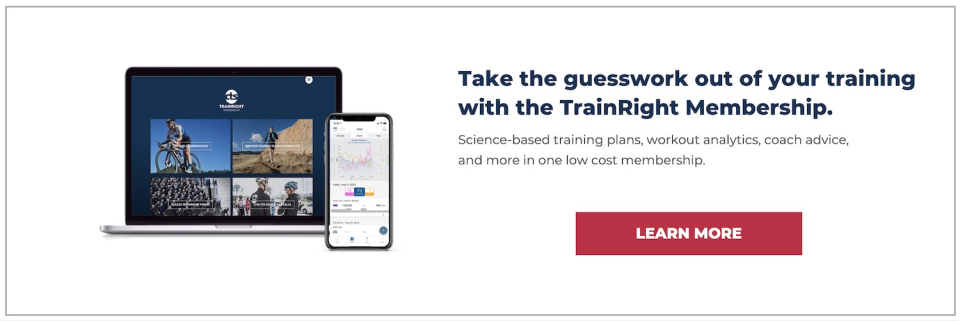The Benefits of Caffeine for Cyclists
Most of us are familiar with our afternoon coffee’s ability to help us through the workday and how strongly ingrained coffee is in cycling culture, but does caffeine actually have a performance enhancing effect during exercise?
Caffeine is one of the world’s most widely used stimulants, with the average caffeine consumption in the United States around two cups of coffee (200mg) per day.

Can Caffeine Improve Your Performance?
It turns out that caffeine can do more than help you wake up in the morning or beat afternoon sluggishness; it can act as an effective ergogenic aid when used properly. In a systematic review of 21 studies, researchers discovered around a 3.2% improvement in endurance performance (time trial performance, not time to exhaustion) with caffeine ingestion1.
In addition to enhancing longer endurance performance, caffeine has been shown to improve efforts around 5 minutes in length at 90 to 100% of maximal oxygen uptake2.
How Caffeine Improves Exercise Performance
While there has not been much doubt to the effectiveness of caffeine for endurance athletes, the mechanism by which it improves performance is less clear. A leading theory is that caffeine affects the brain and central nervous system, increasing alertness and focus and modulating central fatigue. Caffeine has also been shown to increases fat utilization by working muscles, thereby sparing muscle glycogen. This appears to have a more minor impact on performance, but it is measurable nonetheless.
How Much Caffeine Should You Consume to Enhance Performance?
The amount of caffeine needed to see performance enhancing effects is in the range of three to six milligrams per kilogram of body mass1. A 75-kilogram (165-pound) athlete, at three milligrams per kilogram of body mass, would want to consume roughly 225mg of caffeine, which is a bit more than what’s in 16 ounces of coffee (200mg). On the high side of the range, the same athlete would aim to consume 450mg of caffeine.
It is important to realize that caffeine does not affect everyone the same way, and that you can habituate to caffeine, meaning you’ll need to consume more in order to achieve an effect. However, in general more is not necessarily better. If 200mg of caffeine works for you, 300 or 400 isn’t likely to increase your performance any further.
And if you don’t like coffee, you can ingest caffeine a variety of ways, including tea, caffeinated sports nutrition products, and soft drinks (although sugary soft drinks aren’t a great choice for athletes). What about caffeine pills? They work, and a 1998 study showed they work a bit better than coffee, but in practical scenarios they make it very easy for an athlete to overdo it with caffeine and experience jitteriness and nausea.
Caffeine metabolism changes with age
If having coffee in the afternoon makes it tough to get to sleep that night, your rate of caffeine metabolism may be part of the reason. You may have been able to drink coffee after dinner and get to sleep when you were in your 20s and 30s, but now in your 50s and 60s a coffee after 2pm keeps you up all night. You’re not imagining it. A 2013 study showed the metabolism of a range of drugs, including caffeine, slows significantly with age. (6)
In the long term, quality sleep will do more to improve your performance than caffeine, so go for a walk to cure the 3 o’clock slump instead of grabbing a coffee. The slowing of caffeine metabolism with age also means older athletes should experiment with consuming caffeine earlier before workouts and races, like 90-120 minutes beforehand instead of 60.
When Should You Consume Caffeine?
Once you consume caffeine it’s quickly absorbed and reaches it’s highest level in the bloodstream within 1-2 hours, and can remain in your system for several hours. Most research suggests ingesting caffeine about 60 minutes prior to an event.
For longer events, such as an Ironman, some athletes will benefit from consuming additional caffeine during the event from drinks, gels or energy chews. This will help sustain the caffeine levels in the bloodstream in the later parts of the race.
If you’re planning on using caffeine to improve performance, you may benefit from reducing your daily consumption to reduce your tolerance to it1. This is something you should test in training, as it may influence the amount of caffeine you want to consume during exercise. If your tolerance is lower, you minimum effective dose of caffeine may be lower. This can be helpful if consuming large amounts of caffeine – or caffeine-containing performance foods – upsets your stomach.
Caffeine May Help Improve Recovery
Caffeine may be able to quicken glycogen replenishment after a workout. A post-exercise drink with 4 g/kg carbohydrate and 8 mg/kg caffeine showed a 66% increase in glycogen resynthesis when compared to a carbohydrate only drink5. If you’re doing two workouts a day or need to quickly replenish glycogen stores for your next day’s workout this could be an effective way to jumpstart your recovery.
What Are the Drawbacks of Caffeine?
It’s important to acknowledge that you can over do it with caffeine and cause more harm than good. Doses of 9 mg/kg or more are likely to impair performance and cause side effects including “…anxiety, jitters, inability to focus, gastrointestinal unrest, insomnia, irritability, and, with higher doses, the risk of heart arrhythmias and mild hallucinations.”2 Caffeine can also be quite addictive and cause less than pleasant symptoms if you try to cut back the amount of caffeine you consume.
A Simple Action Plan to See Benefits From Caffeine
- Test different amounts of caffeine in training to see how your body responds.
- If you habitually consume caffeine, try reducing daily consumption to see if it changes the effect size of exercise-associated consumption.
- 60 minutes before your event consume 3-6 mg/kg of caffeine or the amount that worked best for you in training.
- Consume caffeinated sports drinks, gels, or energy chews during long events.
To find out more, please visit: https://trainright.com/caffeine-cyclists-triathletes-runners/
FREE 14 DAY MEMBERSHIP TRIAL
Gran Fondo Guide fans, click on the image above and get TrainRight Membership for a 14 day no obligation trial. TrainRight Membership comes with a 30-day money-back guarantee!
About CTS
As it has since 2000, Carmichael Training Systems leads the endurance coaching industry with proven and innovative products, services, and content. And the results speak for themselves; no other coaching company produces more champions, in such a wide variety of sports and age groups, than CTS.
For more information, please visit: https://trainright.com

